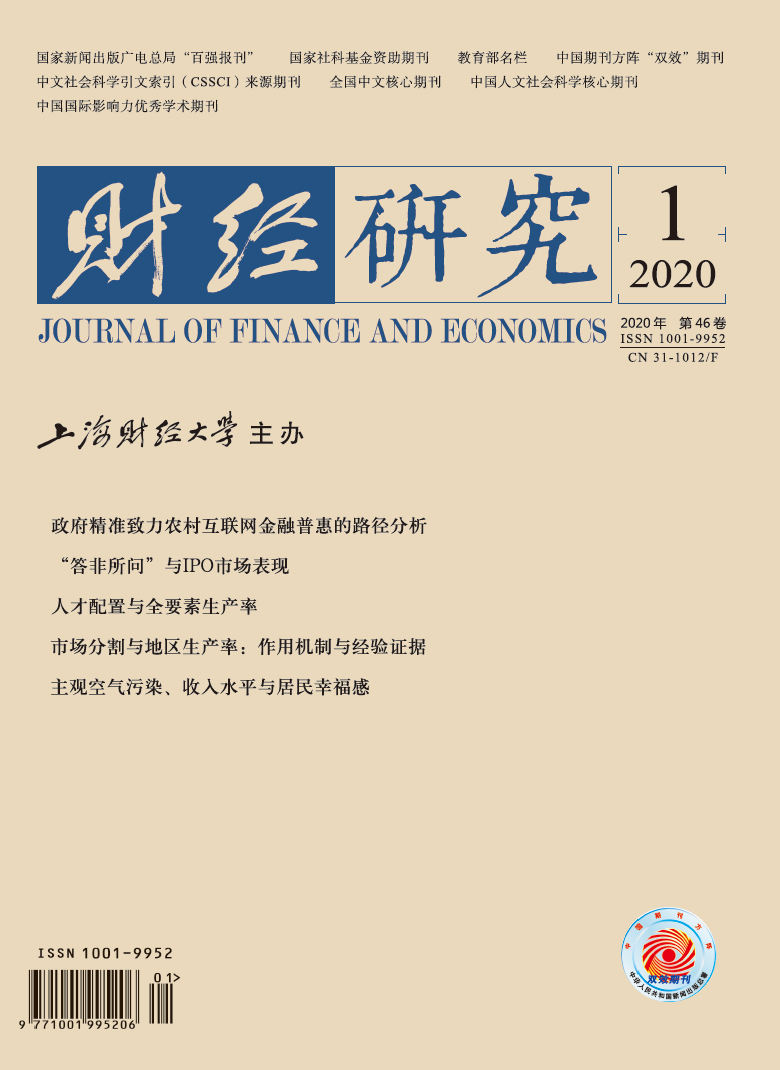[1] CIID, Li S. The changing trend of middle-income group scale in China[R]. 2017. (In Chinese)
[2] Chen Y W, Shi Y P. Air quality pricing under the happiness economics perspective: a study based on the 2010 data of Chinese Family Panel Studies (CFPS)[J]. Economic Science, 2013, (6): 77-88. (In Chinese)
[3] Chu D Y, He P F, Liang R B. Perceived air pollution and happiness: Evidence from a regression discontinuity design based on the microdata[J]. Economic Perspectives, 2017, (2): 88-101. (In Chinese)
[4] Fan Y C, Hong D Y. Differential-exposure, differential-occupation, and differential-experience: An empirical analysis on differences in chinese urban-rural residents’ environmental concern[J]. Chinese Journal of Sociology, 2015, (3): 141-167. (In Chinese)
[5] Li L L, Shi L. Economic growth and subjective well-being: Analyzing the formative mechanism of Easterlin paradox[J]. Sociological Studies, 2017, (3): 95-120. (In Chinese)
[6] Li P L. How to define the middle-income group more accurately[N]. Beijing Daily, 2017-07-17(14). (In Chinese)
[7] Luo C L. Absolute income, relative income and subjective well-being: Empirical test based on the sample data of urban and rural households in China[J]. Journal of Finance and Economics, 2009, (11): 79-91. (In Chinese)
[8] Nie W. Urban-rural differences and decomposition of public environmental concerns[J]. Journal of China University of Geosciences (Social Sciences Edition), 2014, (1): 62-70. (In Chinese)
[9] Wang Y, Hao C H, Shi M C. Does environmental pollution provoke public environmental concern?[J]. Journal of Finance and Economics, 2018, (11): 106-124. (In Chinese)
[10] Wang Y J, Han D L. Economic development, environmental pollution and public pro-environmental behavior: A multi-level analysis of the 2013 Chinese General Social Survey[J]. Journal of Renmin University of China, 2016, (2): 79-92. (In Chinese)
[11] Yan M, Fan J. Regional disparity of real income in China based on purchasing power parity[J]. Economic Geography, 2016, (6): 1-7. (In Chinese)
[12] Yang J D, Zhang Y R. Air pollution pricing: a study based on happiness data[J]. The Journal of World Economy, 2014, (12): 162-188. (In Chinese)
[13] Zhang Y C, Zhou Z Y, Chen F, Zhang Y P. Construction and the comparative study on sub-national PPP in China[J]. Statistics & Information Forum, 2019, (3): 9-17. (In Chinese)
[14] Davis J J. Riskier than we think? The relationship between risk statement completeness and perceptions of direct to consumer advertised prescription drugs[J]. Journal of Health Communication, 2000, 5(4): 349-369. DOI:10.1080/10810730050199141
[15] Di Tella R, MacCulloch R. Gross national happiness as an answer to the Easterlin Paradox?[J]. Journal of Development Economics, 2008, 86(1): 22-42. DOI:10.1016/j.jdeveco.2007.06.008
[16] Diekmann A, Franzen A. The wealth of nations and environmental concern[J]. Environment and Behavior, 1999, 31(4): 540-549. DOI:10.1177/00139169921972227
[17] Diener E, Seligman M E P. Beyond money: Toward an economy of well-being[J]. Psychological Science in the Public Interest, 2004, 5(1): 1-31. DOI:10.1111/j.0963-7214.2004.00501001.x
[18] Direnfeld D M, Roberts J E. Mood congruent memory in Dysphoria: The roles of state affect and cognitive style[J]. Behaviour Research and Therapy, 2006, 44(9): 1275-1285. DOI:10.1016/j.brat.2005.03.014
[19] Easterlin R A. Does economic growth improve the human lot? Some empirical evidence[A]. David P A, Reder M W. Nations and households in economic growth[C]. New York: Academic Press, 1974.
[20] Ferrer-i-Carbonell A. Income and well-being: An empirical analysis of the comparison income effect[J]. Journal of Public Economics, 2005, 89(5-6): 997-1019. DOI:10.1016/j.jpubeco.2004.06.003
[21] Foo M D. Emotions and entrepreneurial opportunity evaluation[J]. Entrepreneurship Theory and Practice, 2011, 35(2): 375-393. DOI:10.1111/j.1540-6520.2009.00357.x
[22] Graham C, Pettinato S. Happiness, markets, and democracy: Latin America in comparative perspective[J]. Journal of Happiness Studies, 2001, 2(3): 237-268. DOI:10.1023/A:1011860027447
[23] Gu D, Huang N W, Zhang M X, et al. Under the dome: Air pollution, wellbeing and pro-environmental behavior among Beijing residents[J]. Journal of Pacific Rim Psychology, 2015, 9(2): 65-77. DOI:10.1017/prp.2015.10
[24] Klerck D, Sweeney J. The effect of knowledge types on consumer-perceived risk and adoption of genetically modified foods[J]. Psychology & Marketing, 2007, 24(2): 171-193.
[25] Levinson A. Valuing public goods using happiness data: The case of air quality[J]. Journal of Public Economics, 2012, 96(9-10): 869-880. DOI:10.1016/j.jpubeco.2012.06.007
[26] Li Z T, Folmer H, Xue J H. To what extent does air pollution affect happiness? The case of the Jinchuan mining area, China[J]. Ecological Economics, 2014, 99: 88-99. DOI:10.1016/j.ecolecon.2013.12.014
[27] Liu Z M, Rommel J, Feng S Y, et al. Can land transfer through land cooperatives foster off-farm employment in China?[J]. China Economic Review, 2017, 45(5): 35-44.
[28] Luechinger S. Valuing air quality using the life satisfaction approach[J]. The Economic Journal, 2009, 119(536): 482-515. DOI:10.1111/j.1468-0297.2008.02241.x
[29] MacKerron G, Mourato S. Life satisfaction and air quality in London[J]. Ecological Economics, 2009, 68(5): 1441-1453. DOI:10.1016/j.ecolecon.2008.10.004
[30] Mangyo E. The effect of water accessibility on child health in China[J]. Journal of Health Economics, 2008, 27(5): 1343-1356. DOI:10.1016/j.jhealeco.2008.04.004
[31] Rehdanz K, Maddison D. Local environmental quality and life-satisfaction in Germany[J]. Ecological Economics, 2008, 64(4): 787-797. DOI:10.1016/j.ecolecon.2007.04.016
[32] Riddel M, Shaw W D. A theoretically-consistent empirical model of non-expected utility: An application to nuclear-waste transport[J]. Journal of Risk and Uncertainty, 2006, 32(2): 131-150. DOI:10.1007/s11166-006-8290-0
[33] Shaw W D, Woodward R T. Why environmental and resource economists should care about non-expected utility models[J]. Resource and Energy Economics, 2008, 30(1): 66-89. DOI:10.1016/j.reseneeco.2007.05.001
[34] Smyth R, Mishra V, Qian X L. The environment and well-being in urban China[J]. Ecological Economics, 2008, 68(1-2): 547-555. DOI:10.1016/j.ecolecon.2008.05.017
[35] Van Praag B M S, Baarsma B E. Using happiness surveys to value intangibles: The case of airport noise[J]. The Economic Journal, 2005, 115(500): 224-246. DOI:10.1111/j.1468-0297.2004.00967.x
[36] Welsch H. Preferences over prosperity and pollution: Environmental valuation based on happiness surveys[J]. Kyklos, 2002, 55(4): 473-494. DOI:10.1111/1467-6435.00198
[37] Welsch H. Environment and happiness: Valuation of air pollution using life satisfaction data[J]. Ecological Economics, 2006, 58(4): 801-813. DOI:10.1016/j.ecolecon.2005.09.006
[38] Yuan L, Shin K, Managi S. Subjective well-being and environmental quality: The impact of air pollution and green coverage in China[J]. Ecological Economics, 2018, 153: 124-138. DOI:10.1016/j.ecolecon.2018.04.033
[39] Zhang X, Zhang X B, Chen X. Happiness in the air: How does a dirty sky affect mental health and subjective well-being?[J]. Journal of Environmental Economics and Management, 2017, 85: 81-94. DOI:10.1016/j.jeem.2017.04.001





 7842
7842  8063
8063

